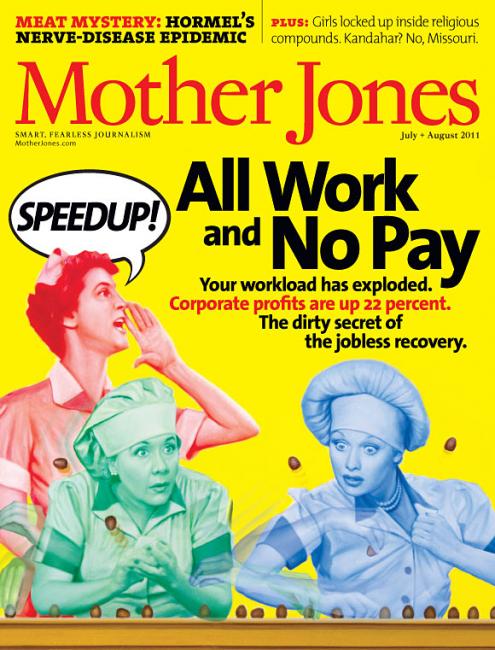Notes
Ha! Ha! Being Worked to Death
Webster’s defines speedup as “an employer’s demand for accelerated output without increased pay,” and it used to be a household word. Bosses would speed up the line to fill a big order, to goose profits, or to punish a restive workforce. Workers recognized it, unions (remember those?) watched for and negotiated over it—and, if necessary, walked out over it.
But now we no longer even acknowledge it—not in blue-collar work, not in white-collar or pink-collar work, not in economics texts, and certainly not in the media (except when journalists gripe about the staff-compacted-job-expanded newsroom). Now the word we use is “productivity,” a term insidious in both its usage and creep. The not-so-subtle implication is always: Don’t you want to be a productive member of society? Pundits across the political spectrum revel in the fact that US productivity (a.k.a. economic output per hour worked) consistently leads the world. Yes, year after year, Americans wring even more value out of each minute on the job than we did the year before. U-S-A! U-S-A!
Except what’s good for American business isn’t necessarily good for Americans. We’re not just working smarter, but harder. And harder. And harder, to the point where the driver is no longer American industriousness, but something much more predatory. –from: All Work and No Play by By Monika Bauerlein and Clara Jeffery. (Mother Jones)
1. What’s slapstick is the unquestioned sanctity of the American work ethic, this patriotic ideal locked, as it is, in the ’50’s.
2. The original Lucille Ball video segment now plays like the canary in the coal mine. What’s most jarring at this point is the laugh track. The clip isn’t at all funny anymore. In fact, looking back from today, the humor is almost impossible to understand.
3. Most fitting is how last week’s (all woman) cover predates the Walmart decision.
(Illustration: Tim O’Brien)



Reactions
Comments Powered by Disqus